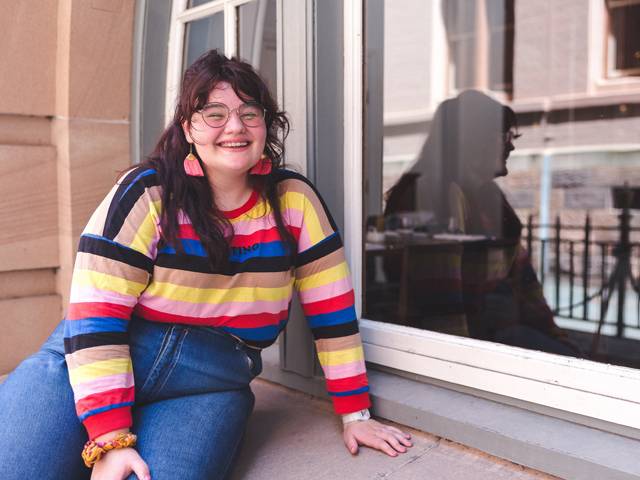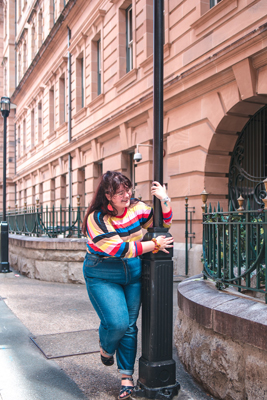Abby McDonald Eradicate Bullying Interview

Introducing Brisbane Local and Mental Health Advocate, Abby McDonald
Brisbane local, youth mental health advocate and speaker, Abby McDonald, is campaigning for change in Australian schools and amongst students to eradicate bullying in Australia – and she's only 17-years-old.
Bullying is a serious problem in Australia, with three in five students nationally saying they've experienced the negative impacts of bullying.
Abby had a difficult time during school from grade one, struggling with bullying and eventually turning to self-harm at the age of twelve and suicide attempts at thirteen. Her incredible story of perseverance after a life-saving experience in the back of an ambulance inspired her to speak out, so others can understand and stop the hardships she endured. Abby is now working alongside Digital8, a national web design and digital marketing agency, who have assisted her in creating a platform to share her story: https://abbymcdonald.com.au/.
Interview with Abby McDonald
Question: Can you share your experience with bullying?
Abby McDonald: Each and every single person has a unique experience with bullying. Sadly, mine started in grade one. For most of primary school it was just the occasional tease passed off as immaturity. However, when I reached high school it got worse and worse to the point where I didn't feel worthy enough to exist. It was like I wasn't human. In year 8, it got to the point where I couldn't handle it. My best friend started bullying me and gave people bribes to come hit me. They were being 'paid' in lollies to come and hurt me. I remember sitting there thinking my life and my existence is worth the same as some lollies.
By the end of grade 8, I was exhausted and tired. I felt like I couldn't go on anymore. I was twelve at the time and decided to start self-harming. I couldn't handle how sad I was. I couldn't handle how anxious I was and how much I hated myself. I remember on my thirteenth birthday just crying in my bed. It was another year to celebrate my existence that I was a stranger to. When I reached grade nine, I felt like I couldn't go on anymore. That's' when I first attempted suicide. For the next three years, I was in and out of hospitals. I was constantly attempting suicide and self-harming daily. It took me four years to get out of the hole and realise that I am worthy. It took the bully five words to change my life.
I dealt with three very different yet horrendous types of bullying. I was cyber bullied by strangers that my main bully would organise to target me, I was emotionally/verbally bullied and at one point it reached to psychical bullying. I was bullied to the point where I felt helpless; I felt like my existence was a mistake.
Question: Why have you chosen to share this heartbreakingly honest experience with Australians?
Abby McDonald: Honestly, I don't think I chose it; it's more like it chose me. I always think back to twelve-year-old Abby and how she wished she had someone to discuss these things with, making her feel worthy and knowing that she isn't alone. My experience isn't an isolated one. I know that there are so many others out there who are struggling with their own issues and heartbreaking experience. I kind of think back to myself often if not me, then who?
Question: Can you tell us about your work with Digital8?
Abby McDonald: Digital8 have been absolutely fundamental in helping me not only share my experience and advice, but also in helping me create a platform where I can amplify that message. They created such a beautiful website pro-bono as they truly believe in what I am doing and my cause to stop bullying and improve student's mental health. Without Digital8, I would not have had a fundamental tool that represents me and my role as an advocate. The team have provided so much clarity around only my business values and motivated me both professionally and personally.
Question: How are you campaigning to eradicate bullying in Australia?
Abby McDonald: From my experience I don't think bullying will be able to be completely eradicated but I do believe it can be managed. The three key things I think are important to focus on is spreading kindness, compassion and empathy. Often people think that acts of kindness have to be a huge ordeal and make people go "wow", when in reality it could be the smallest of gestures that brightens someone's day. It's all about creating a ripple effect of kindness, compassion and empathy in the world.
Question: What advice do you have for students who are currently struggling with bullying at school?
Abby McDonald: Open up. Seriously, that's it. I wish I spoke more openly about what I was going through and actually told someone instead of bottling it all up. I felt like what was happening was my fault when in actual fact, it's not your issue, it's the bullies. Another thing that is important is to validate what you are going through and how you are feeling. I kept comparing what I was going through to others and undermining how and why I felt the way I did. I wish I could go back and validate how I felt and realise that those feelings really sucked, rather than holding it all in.
Question: What detrimental impacts of bullying can parents look for in their children?
Abby McDonald: There are many ways bullying can impact on kids. Each child / teen is different and therefore will handle the situation in a different way. I can only speak from my own experience, but I definitely became more withdrawn from my life. I lost what I was passionate about and became scared of everything. I refused to leave my room and became quite self-conscious.
Another thing to look out for is negative self-talk. I started using quite negative language when referring to myself and what I was doing. I would call myself fat, ugly and dumb almost daily. This may sound quite cheesy but one thing I noticed was that I lost the sparkle in my eye. I know that sounds extremely cliché, but I swear it's true. I became a dull person. There are many different ways it can impact kids/teens and this is only my experience.  Question: How can parents encourage open dialogue with their children around bullying?
Question: How can parents encourage open dialogue with their children around bullying?
Abby McDonald: Create an open and non-judgmental space for their kids and get them out of the house. I found that the only way I really felt safe opening up was when my mum and I were in the car driving. I was able to get out of my comfort zone (as toxic as it was) and shed my practiced habits to find a new environment that felt a bit more open, where I was able to unload.
Tone and language are also extremely important when discussing these significant and vulnerable topics. By showing that you are actively listening and conveying to your kids that they are being heard, you're validating their emotions and engaging in a sensitive topic. Not only will this make them feel like respected and understood, but they can engage at a greater depth which makes them feel worthy.
Another way that parents can encourage open dialogue is to eliminate the stigma and make it an acceptable topic of conversation. I remember when I first started getting bullied, I was too scared to open up to anyone because a lot of the time people tried to avoid the topic or ignore it. By acknowledging what is going on in your child's life and, parents should help create an understanding that it's ok to be struggling with what you are going through. It can really help to encourage more conversations and create a balance between parents and kids.
Question: What advice do you have for schools to eradicate bullying in Australia?
Abby McDonald: Stop making bullying a taboo subject. I was so exhausted by the end of my bullying experience at school. I was exhausted because they refused to acknowledge that there was bullying going on. The school wanted to dance around the subject and call it basic teasing or "girl fights". We as a society need to show the next generation that bullying is unforgivable but that it is happening and we need to make these changes ourselves. We need to talk more openly about not only bullying but mental health in general. Make it a subject that people are able to understand and empathise with.
Question: Can you share your goals, for the next six months, with us?
Abby McDonald: I have taken 2019 off to decide where I truly want my company to go and to reevaluate my values. I want the teens and kids I speak to get the very best they can out of my experience and message. My goal for the next six months is to create a more efficient business structure and to create the best I can for others.
Photo: Emilia Lau
MORE





